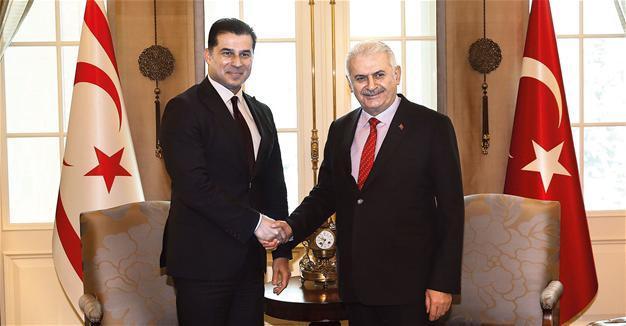Hectic Cyprus diplomacy ahead of Geneva talks
Sevil Erkuş - ANKARA

The Turkish Cypriot leadership is engaging in intense consultations in Ankara to flesh out a joint position before Turkish Cypriot leader Mustafa Akıncı and President Nicos Anastasiades present their respective maps for a settlement in Cyprus.
Turkish Cypriot Prime Minister Hüseyin Özgürgün had talks in Ankara on Jan. 2 with Turkish President Recep Tayyip Erdoğan and Prime Minister Binali Yıldırım ahead of a crucial meeting on Jan. 9 and 10 in Geneva, in which leaders from both communities will try to hammer out a path for the unification of Cyprus. Turkish Cypriot Foreign Minister Tahsin Ertuğruloğlu was also in Ankara last week for consultations.
Foreign minister to meet GuterresThe parties expect that a political framework for a settlement plan will emerge if the Geneva talks are successful.
Turkish Foreign Minister Mevlüt Çavuşoğlu is expected to visit New York before the weekend and meet the U.N.’s new Secretary General, Antonio Guterres, according to Turkish officials. Even if Çavuşoğlu cannot make the visit, Ankara will get in contact with Guterres before the Geneva talks, a Foreign Ministry official told the Hürriyet Daily News.
Greece’s foreign minister initially asked for a meeting with the new Secretary General, after which the Turkish Foreign Ministry approached the U.N.
On Jan. 12, a conference on Cyprus will be convened with the participation of the divided island’s three guarantor powers (Greece, Turkey, and the U.K.), while other relevant parties will be invited as necessary, according to the United Nations.
Greek Cypriots push for participation of ‘Republic of Cyprus’The Turkish Cypriots say it has been agreed that the Jan. 12 meeting will comprise the Greek Cypriots and Turkish Cypriots as well as the guarantor powers Greece, Turkey, and the U.K..
However, the Greek Cypriots are pushing for a separate participation on behalf of “Republic of Cyprus.”
“The Republic of Cyprus, as a relevant party, shall be present, since we are talking about a conference that aims, among other things, to amend international treaties which concern the Republic,” deputy government spokesman Victoras Papadopoulos said in December.
Turkish President Erdoğan will attend the conference if the initial talks produce a political road map.
In November the two leaders held two rounds of talks at Mont Pelerin, Switzerland, focusing on the territorial aspect of the Cyprus problem. The U.N. announced after the end of their talks that despite their best efforts, they were unable to achieve necessary further convergences on criteria for territorial adjustments that would have paved the way for the last phase of the talks.
“A constitution and federal laws will need to be drafted. No doubt, strenuous work will have to be carried out to finalize even the smallest details before the first half of 2017. It is possible to complete all this in a couple of months if the political framework exists,” Turkish Cypriot President Mustafa Akıncı said on Dec. 30.
Several issues pertaining to the territory, security and guarantees, property, rotational presidency under governance and power sharing and active participation in decision-making remain pending an agreement, Akıncı added.
 The Turkish Cypriot leadership is engaging in intense consultations in Ankara to flesh out a joint position before Turkish Cypriot leader Mustafa Akıncı and President Nicos Anastasiades present their respective maps for a settlement in Cyprus.
The Turkish Cypriot leadership is engaging in intense consultations in Ankara to flesh out a joint position before Turkish Cypriot leader Mustafa Akıncı and President Nicos Anastasiades present their respective maps for a settlement in Cyprus.